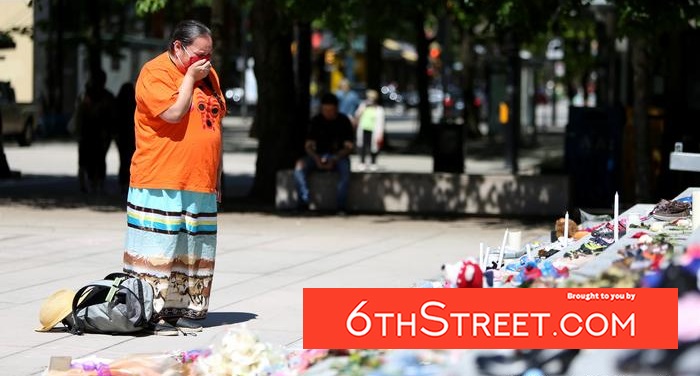
Canadian Prime Minister Justin Trudeau on Monday said it was not an isolated incident that more than 200 Indigenous children were found buried at a former boarding school.
The prime minister's comments came after First Nations leaders urged to government to excavate school burial sites across the country, which he agreed would be "an important part of discovering the truth."
Remains of 215 Indigenous students, some as young as 3-years-old, who were registered at the Kamloops Indian Residential School in British Colombia were found by the Tk'emlups te Secwepemc First Nation last week using ground-penetrating radar.
The British Columbia coroner is helping the tribe establish the causes and timings of the student deaths at the Kamloops site.
What did Trudeau say?
"As a dad, I can't imagine what it would feel like to have my kids taken away from me," Trudeau said at a news conference. "And as prime minister, I am appalled by the shameful policy that stole Indigenous children from their communities."
"Sadly, this is not an exception or an isolated incident," he said. "We're not going to hide from that. We have to acknowledge the truth. Residential schools were a reality — a tragedy that existed —here, in our country, and we have to own up to it. Kids were taken from their families, returned damaged or not returned at all."
The prime minister also said he'll be talking to his ministers about further steps his government needs to do to support survivors and the community.
"Canada will be there to support Indigenous communities as we discover the extent of this trauma and trying to give opportunities for families and communities to heal," he said.
Canada in mourning
Flags atop government buildings were lowered to half-staff over the weekend, while empty pairs of children's shoes were placed in front of the parliament in Ottawa and on steps outside government offices and churches in several cities.
About 100 people in the Mohawk community of Kahnawake, near Montreal, marched on Sunday, many of them wearing ceremonial attire.
Plans are underway to bring in forensics experts to identify and repatriate the remains of the children found buried on the site.
What did Indigenous leaders, opposition members say?
Perry Bellegarde, the national chief of the Assembly of First Nations, called on the government to launch an inquiry at the former residential schools.
"A thorough investigation into all former residential school sites could lead to more truths of the genocide against our people," he said, according to the Globe and Mail newspaper.
The Federation of Sovereign Indigenous Nations and the Saskatchewan government said they want the federal government to help research undocumented deaths and burials at residential schools in the province.
Federation Chief Bobby Cameron said finding the children's remains and giving them proper burials is important to help First Nations communities and families find closure.
They have compiled a list of initial sites where they hope to complete radar ground searches.
On Monday, opposition New Democratic Party (NDP) leader Jagmeet Singh called for an emergency debate in Parliament on the "heart-breaking" discovery — to which Trudeau agreed.
Sol Mamakwa, an Indigenous NDP legislator in Ontario, also called on the government to search the grounds of other former residential schools.
"It is a great open secret that our children lie on the properties of former schools. It is an open secret that Canadians can no longer look away from," he said.
What was the Kamloops Residential School?
The residential school was the largest among 139 others that were set up in the 19th century to forcibly assimilate Canada's Indigenous peoples.
It held children taken from families across the country and had up to 500 students registered at any point in time.
The school was operated by the Catholic church on behalf of the Canadian government from 1890 to 1969. It was then taken over by the federal government and operated as a day school until it closed in 1978.
Since the 19th century, more than 150,000 Indigenous children were required to attend state-funded Christian schools as part of a program to force them to learn the traditions of European colonists.
They were forced to convert to Christianity and not allowed to speak their native languages. Physical violence, including sexual abuse, were common in the schools.